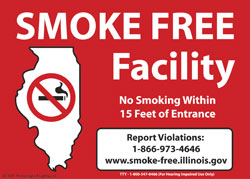
While we as Illinois business owners and advocates were all concerned with the gross receipts tax legislation last year, the Smoke Free Illinois Act (SFIA) was signed into law. The SFIA will affect nearly every entry of every business and place of employment and will also supersede any local smoke-free ordinances that are less restrictive. We, as businesses, must comply or risk daily fines for failure to do so.
What’s the bottom line?
Education and posting signs.
Right now, almost every business needs to be educating their employees of the changes. On January 1st, 2008, SFIA signs must be posted at all entrances of affected businesses. These sign requirements are specific—the classic “No Smoking” sign will not comply.
The Illinois Department of Public Health has provided us with the following Frequently Asked Questions:
Will the Smoke Free Illinois Act replace the Illinois Clean Indoor Air Act?
Yes, the Illinois Clean Indoor Air Act will be repealed when the Smoke Free Illinois Act takes effect.
When does the Smoke Free Illinois Act go into effect?
January 1, 2008.
Have the administrative rules been codified yet and where can I find them?
The Illinois Department of Public Health is in the process of writing rules which the new law will implement. Once drafted and approved by the State Board of Health, the proposed rules will be published in the Illinois Register and on the Department’s Proposed and Recently Adopted Rules webpage.
Who is responsible for enforcing the Act?
The Illinois Department of Public Health, local public health departments and local law enforcement agencies are required to enforce the Act. These agencies may assess fines for violation of the Act.
Will there be a phone number to call to register complaints?
The Illinois Department of Public Health will establish a telephone number by January 1, 2008, which citizens can call to register complaints.
Who can be fined and what are the fines for violating the act?
Any person, corporation, partnership, association or other entity violating the no-smoking provisions of the Act may be fined by one of the enforcement agencies. Violations occurring on separate days are considered individual violations which can each be ticketed. A person who smokes in a prohibited area will be fined $100 to $250. A person who owns, operates or otherwise controls a public place or place of employment which violates the Act will be fined no less than $250 for the first violation, no less than $500 for the second violation within one year of the first violation and no less than $2,500 for each additional violation within one year after the first violation.
Where will smoking not be allowed?
Smoking will be prohibited in public places, places of employment or within 15 feet of an entrance to a public place or place of employment, unless exempted by the Act. No person may smoke in any vehicle owned, leased or operated by the state or a political subdivision of the state.
Where will be smoking be allowed?
Smoking will be allowed in the following areas:
- Private residences or dwelling places, except when used as a child care, adult day care or healthcare facility or any other home-based business open to the public.
- Retail tobacco stores in operation prior to January 1, 2008. These are defined in the Act as establishments which derives more than 80 percent of its gross revenue from the sale of loose tobacco, plants or herbs; cigars, cigarettes, pipes and other smoking devices for burning tobacco; related smoking accessories; and in which the sale of other products is merely incidental. “Retail tobacco store” does not include a tobacco department or section of a larger commercial establishment, or an establishment with any type of liquor, food or restaurant license.
- Private and semi-private rooms in nursing homes and long-term care facilities occupied by one or more persons, all of whom are smokers and have requested in writing to be placed in or to remain in a room where smoking is permitted. The smoke must not infiltrate other areas of the nursing home or long term care facility.
- Hotel and motel sleeping rooms which are rented to guests and designated as smoking rooms, provided that all smoking rooms on the same floor must be contiguous, and that smoke from those rooms will not infiltrate non-smoking rooms or other areas where smoking is prohibited. Not more than 25 percent of the rooms in a hotel or motel may be designated as rooms in which smoking is allowed. The status of rooms as smoking and non-smoking may not be changed, except to permanently add additional non-smoking rooms.
How does the Act define “smoke” and “smoking?”
“Smoke” and “smoking” mean the carrying, smoking, burning, inhaling or exhaling of any kind of lighted pipe, cigar, cigarette, hookah (e.g., shisha or sheesha), weed, herbs or any other lighted smoking equipment.
Will business owners need to post “No Smoking” signs and remove ashtrays?
Yes, the signage and ashtray requirements are as follows:
- “No Smoking” signs or the international “No Smoking” symbol consisting of a pictorial representation of a burning cigarette enclosed in a red circle with a red bar across it, must be clearly and conspicuously posted in each public place and place of employment where smoking is prohibited.
- Each public place and place of employment where smoking is prohibited must have posted at every entrance a conspicuous sign clearly stating that smoking is prohibited.
- All ashtrays must be removed from areas where smoking is prohibited.
Can other non-smoking areas be established?
An employer, owner, occupant, lessee, operator, manager or other person in control of any public place or place of employment may designate non-enclosed areas, including outdoor areas, as areas where smoking is also prohibited, provided signs are conspicuously posted. IBI
FAQ provided by the Illinois Department of Public Health. More information can be found at www.smoke-free.illinois.gov.

